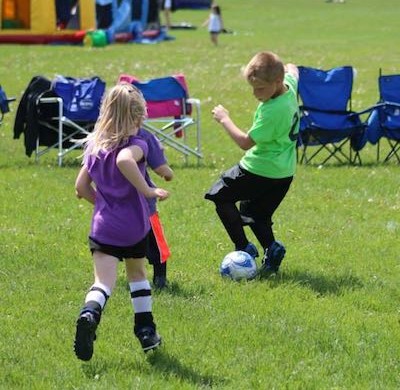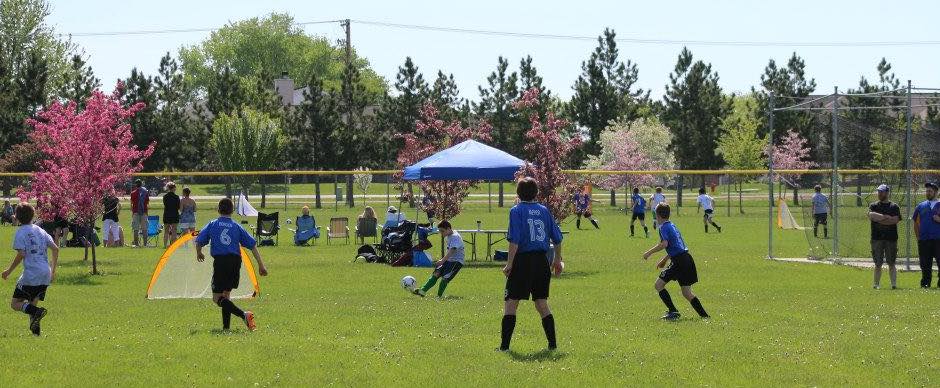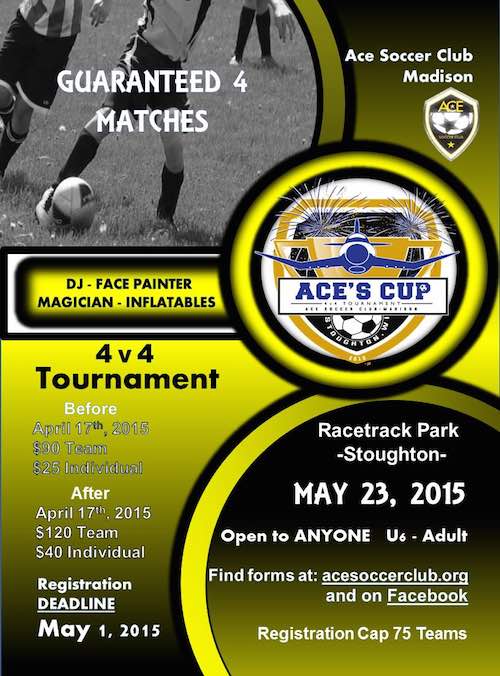Making A Difference in Youth Soccer – Eliminating The Focus On Pay-To-Play
The ACE Soccer Club was kicked off in April 2009 and has grown to be one of the top clubs in their area. With three locations, Racine, Kenosha, and Milwaukee, ACE SC works with youth soccer players in underserved communities. With the approach that desire, dedication, discipline and diversity can make powerful changes, Oscar Toscana and his team of coaches work hard to achieve technical and tactical excellence on the field and make soccer available to all who share the love of the game.
Here is their story of how real vision and passion changes lives – an in-depth interview with Oscar Toscano, President, Marcus Weesner, Director of Coaching and Sean Stake, Assistant Director of Coaching of ACE Soccer Club.
Diane Scavuzzo: Why do you do what you do? What inspires you?
Oscar Toscano: Changing people’s lives through soccer is what inspires me.
Sean Stake: For the love of the game, the desire to inspire, and the opportunity to have a positive impact on others.
 Diane Scavuzzo: If you look back, when did your passion for soccer start? Why do you do what you do?
Diane Scavuzzo: If you look back, when did your passion for soccer start? Why do you do what you do?
Oscar Toscano: My passion for soccer began in 1980 when we moved from Mexico to Racine WI. My dad played for an all German Team. He would round up the family and take us to all of his games.
Diane Scavuzzo: How is your new club different than other options in your area?
Marcus Weesner: ACE Soccer Club was started in 2009 by Oscar Toscano and quickly grew and has several locations in Wisconsin and one in Illinois.
The newest club location is Madison, Wisconsin, where we will bring quality soccer instruction at a low cost. ACE Soccer does not discriminate based on income or ethnicity. If you are interested in learning soccer we will find a way to make it happen.
Sean Stake: Our goal is to provide high quality coaching to anyone who wants to play. We strive to provide opportunities to those who may not be able to afford the higher priced clubs through scholarships and fundraising activities like our tournament.
Oscar Toscano: Our club is different because we provide playing opportunities for children who will never have an opportunity because of financial reasons. We began as a inner city soccer program in 2005 and wanted these children to be seen at a state and regional level. In 2009 ACE was started and quickly grew as one of the most competitive clubs in the state and Midwest region.
Diane Scavuzzo: What are your thoughts on Pay-To-Play?
Oscar Toscano: Soccer is for everyone and money should not determine whether you can play or not.
Sean Stake: It is an exclusionary policy that overlooks those who can’t afford it, much like many things in America.
Marcus Weesner: It only limits participants and targets a specific audience. Years ago, at a ‘traditional’ soccer club, I coached a team and ran training sessions at a local park. A young man on the team would walk to training twice a week with his cousin who would sit and watch on the park bench. After 2 weeks of this I finally walked over and asked the cousin, “Do you like soccer? Do you want to play with us?” He then told me that he loved soccer and played at home with his family almost every day but they have no money. I confirmed his financial situation with his parents, and signed him up without payment for the season. It was the right thing to do. Weeks later, the club board found out and was not happy. This is what comes to mind when I hear Pay-To-Play.
 Diane Scavuzzo: Has the high cost of organized youth soccer in America impacted your life?
Diane Scavuzzo: Has the high cost of organized youth soccer in America impacted your life?
Marcus Weesner: I come from a middle to low income family. My father was a blue collar worker until his company shut down. After that, he ended up staying home with four kids while my mom worked as a foreign language teacher. They were even able to put my brother and me in soccer. One year my mother signed me up for a soccer camp run by the University of Notre Dame. We didn’t know that the camp doubled as tryouts for the youth premier league “Jr. Irish,” a traveling youth soccer club. At the end of the camp, the director told my parents that I made to traveling team. Surprised, my parents asked if there was a cost and he told them it was $1,300.00. I will never forget my parents’ reaction. They laughed and had to walk away. That was the end of my experience with Jr. Irish. This happened over 15 years ago and I still remember it.
This memory and others is what drives me and the thought that others may share a similar experience is what fuels me through the challenging road ahead. If we can prevent this from happening to another young player then it’s a win for us, ACE, and youth soccer.
Diane Scavuzzo: How does it inspire you to offer an option?
Sean Stake: I want everyone’s children to reach their full potential and take the game as far as they can.
Marcus Weesner: Soccer is a game. Games are meant for everyone to play. That’s why my partnership with Oscar and ACE Soccer Club has been a blessing for me.
Diane Scavuzzo: What has been your greatest challenge?
Oscar Toscano: Fighting off politics, the ugly part of soccer and people criticizing what we do.
Marcus Weesner: Absolutely, by far the politics!
 Diane Scavuzzo: Please tell us all about your 4v4 soccer tournament coming up?
Diane Scavuzzo: Please tell us all about your 4v4 soccer tournament coming up?
Marcus Weesner: Sean and I wanted to find a way to excite the local community about soccer. We came up with an idea that was a block party/festival/4v4 tournament.
Sean Stake: It had to be fun, it had to be easy, inexpensive, and bring people together. As coaches we know that 4v4 is the basis for many training activities.
Diane Scavuzzo: Why do you coach?
Oscar Toscano: I coach so I can provide opportunities for our players. These opportunities were given to me and as a result I played at a college level and received an education.
Sean Stake: To help kids. Not just to improve their soccer skills and knowledge, those are important, but I try to use soccer to help them become better human beings. Many of the skills we learn on the field have a real world counterpart.
Marcus Weesner: I coach to stay connected to the sport I love and to ignite this love of the game in those I coach.
Diane Scavuzzo: If you look back at your career, what is the one thing you would change, if you could?
Oscar Toscano: Instead of building my house, I would have built soccer fields.
Diane Scavuzzo: What super power would you like to have and why?
Marcus Weesner: The ability to read the minds of others would be my super power. I’m married and anyone married would testify this would be a great advantage. Just think how it could help in youth soccer.






